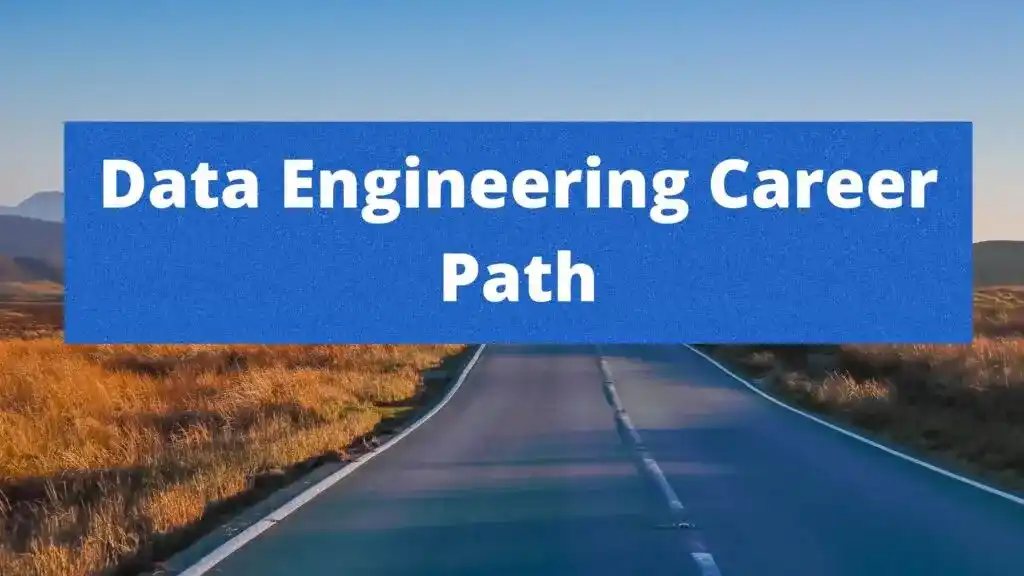So, You are Planning to become a Data Engineer? Good Decision! You have chosen a profitable, secure, and most demanding career. But if you are looking for a complete step-by-step Data Engineering Career Path, then you are in the right place. In this article, you will find all the necessary details regarding Data Engineering.
So, without any further ado, let’s get started!
- Who is Data Engineer?
- What does Data Engineer do?
- Roles and Responsibilities of Data Engineering
- Are data engineers in demand? or Data Engineer Job Trends
- Data Engineer Salary
- What Qualification is Required for Data Engineers?
- Skills Required for Data Engineer
- How to Become a Data Engineer?
- Data Engineering Courses
- Conclusion
- FAQ
Data Engineering Career Path
Before moving to Data Engineering Career Path, I would like to discuss “Who is Data Engineer?”, “What does Data Engineer do?” and “What skills are required for Data Engineering?
Who is Data Engineer?
Data Engineer is a person who is responsible for managing data workflows, pipelines, and ETL processes. As the name suggests, “Data Engineering”, means it is associated with data, namely, their delivery, storage, and processing.
In short, Data Engineer is a person who collects, move, stores, and pre-processes the data for Data Scientists and Data Analysts.
Is a data engineer more in demand than a data scientist?
Yes! Because, Before making a Strawberry Cake, you first need to harvest, clean, and store the Strawberries. Similarly, Data Engineers collect, clean, and pre-process the data before passing it to the data scientists. Without a data engineer, data scientists are not able to solve problems.
I hope now you understood who is Data Engineer is. Now let’s see What does Data engineers do?
What does Data Engineer do?
Data engineers involve in preparing data for analytics or operational users. They also build data pipelines to pull all the information together from different sources.
A Data Engineer aims to make data secure and accessible for data scientists and analysts so that they can analyze it properly. Data engineers deal with raw data that often contains a lot of errors.
Data engineers use various tools and ways to improve the quality, reliability, and efficiency of data. You will understand more about Data Engineering in the next section- Roles and Responsibilities.
Roles and Responsibilities of Data Engineering
- Convert erroneous data into a usable form for further analysis.
- Create large data warehouses using ETL.
- Develop, test, and maintain architectures.
- Develop dataset processes.
- Deploy Machine Learning and statistical methods.
So, these are some main roles and responsibilities of a data engineer. But most roles and responsibilities depend upon the companies.
As in Facebook, the roles and responsibilities of Data engineers are-
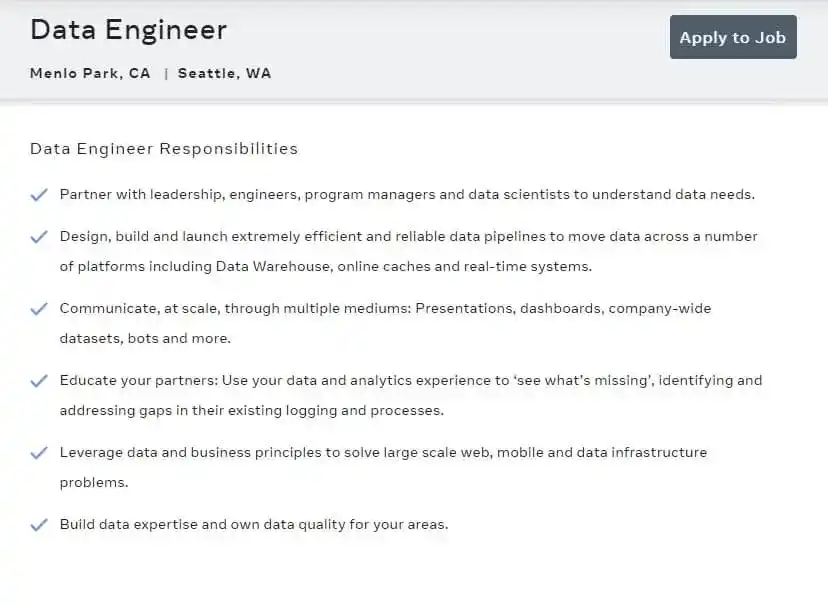
You can check this Data Engineer (Facebook) job details here.
As you are planning to enter into the Data Engineering field, you might have a question in your mind, ”Is Data Engineering a good career?” or “Are data engineers in demand?”. So, let’s see what are the Job Trends?
Are data engineers in demand? or Data Engineer Job Trends
The Dice 2020 Tech Job Report labeled data engineer as the fastest-growing job in technology in 2019, with a 50% year-over-year growth in the number of open positions.
The report also found it takes an average of 46 days to fill data engineering roles and predicted that the time to hire Data Engineers may increase in 2020 “as more companies compete to find the talent they need to handle their sprawling data infrastructure.”
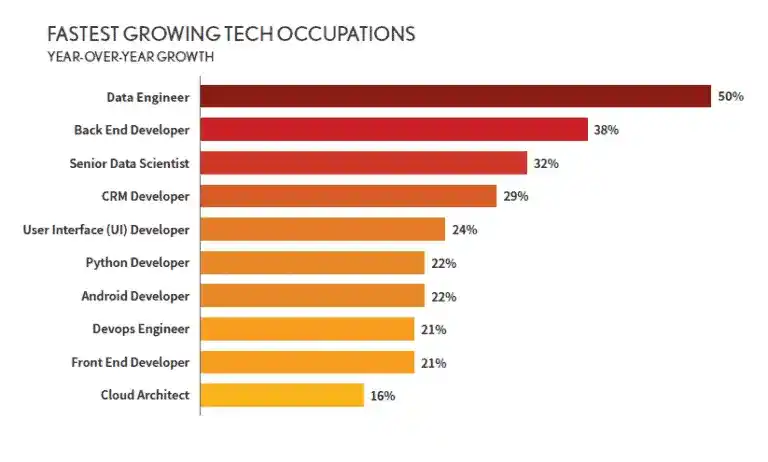
So, according to this data, Data Engineer is a profitable, secure, and most demanding career. Now, let’s see What is the average salary of a Data Engineer?
Data Engineer Salary
According to Indeed, the average salary of a Data Engineer is $129,001 per year in the United States and a $5,000 cash bonus per year.
In other countries, the average salary of a Data Engineer is-
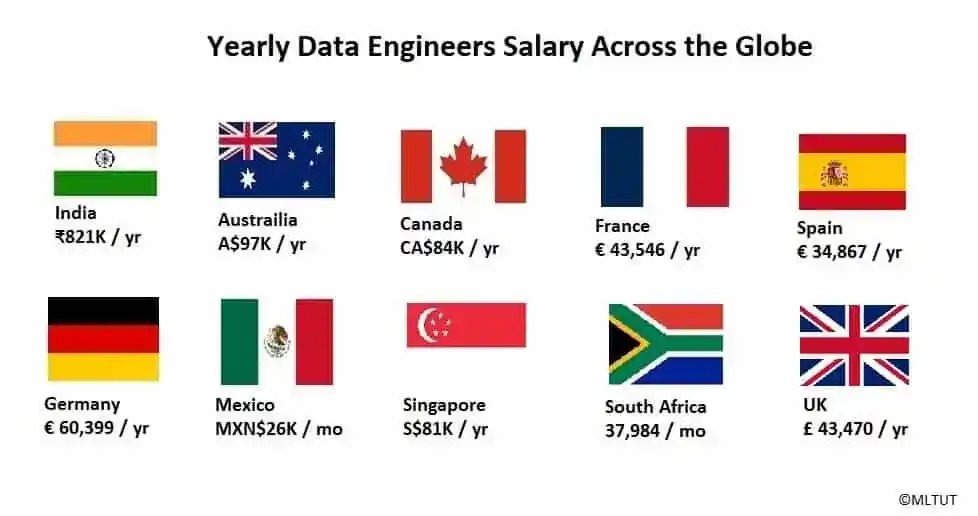
I hope, now you have a clear idea about Data Engineer salaries. Now, let’s move to the most important topic, “Qualification Required for Data Engineers“.
What Qualification is Required for Data Engineers?
As a Data Engineer, you just need an Undergraduate degree in Computer Science, IT, Software Engineering, Math, or a business-related field.
So, this is the required qualification for Data Engineers, but only having a degree is not enough. You should have some required skills to become a Data Engineer.
Now, let’s see What skills are required-
Skills Required for Data Engineer
Before moving to the skills, I would like to share one analysis regarding Data Engineering Skills-
Jeff Hale analyzed job listings for data engineers in January 2020 to see which technology skills are most in-demand. He scraped information from SimplyHired, Indeed, and Monster, to see which keywords appeared with “Data Engineer” in job listings in the United States. And this is the result of his analysis-
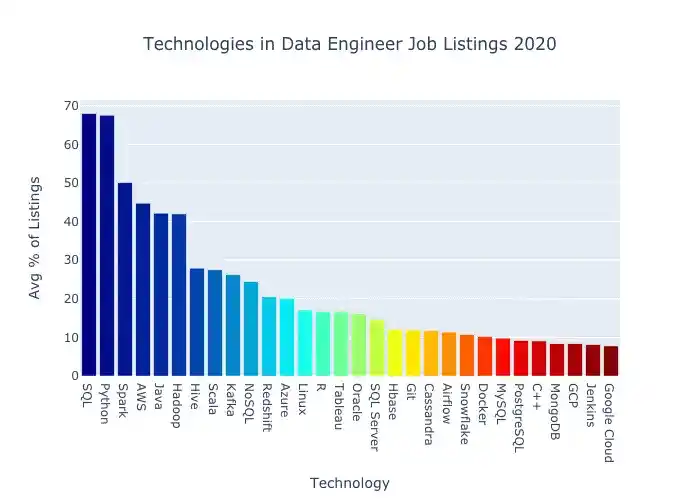
According to his analysis, the most demanding skills or technologies for Data engineers are SQL, Python, Spark, AWS, and more.
Now, let’s what skills are required for Data Engineer-
1. Programming Language
Knowledge of programming language is mandatory for data engineers. There are various data engineering-specific programming languages like Python, Java, and Scala. But as you can see in the Jeff Hale analysis, the demand for Python is high as compared to Java and Scala.
That’s why you should have a strong understanding of Python. Knowing Java and Scala is a plus.
2. In-Depth Database Knowledge
As a Data Engineer, you have to deal with data for a full day. That’s why you should have in-depth knowledge of Database languages and tools. Knowledge of SQL is mandatory. The most demanding technology for data engineering is SQL.
3. Knowledge of Big Data Tools
Nowadays, data is increasing very fast. So to process a huge amount of data, you should be familiar with Big Data Tools. Most of the companies mention “Knowledge of Big Data tools” as compulsory for the Data Engineer post.
That’s why you should know about these Big Data Tools-
- Hadoop and MapReduce.
- Apache Spark
- Apache Hive
- Kafka
- Apache Pig
- Sqoop
4. Data Warehousing and ETL Tools
As a Data Engineer most of the time, you need to perform ETL operations. Data warehousing is very important for managing huge amounts of data. So, knowledge of ETL tools like Informatica & Talend and Data warehousing solutions like Redshift or Panoply is highly valuable.
Informatica & Talend are the two well-known tools used in the industry. Informatica & Talend Open Studio are Data Integration tools with ETL architecture.
5. Data Engineering Cloud Platforms
There are various cloud or on-premise-based platforms available like- Google Cloud Platform, AWS, Azure, and Apprenda. You don’t need to master all these tools. Even it is not mandatory to know all tools. But having a strong knowledge of at least one of them is required.
6. Familiar with Operating System
A Data Engineer should know the ins and outs of infrastructure components, such as virtual machines, networks, applications services, etc. That’s why intimate knowledge of UNIX, Linux, and Solaris is very helpful for you.
7. Machine Learning
Knowledge of Machine learning is primarily considered the domain of a data scientist. But as a Data Engineer, you should have a basic understanding of machine learning algorithms.
8. Data Visualization Tools
Data Visualization is the representation of your finding with the help of graphs, charts, or other visual formats. Tableau and PowerBI are the two most popular Data Visualization tools. Knowledge of Tableau or PowerBI is a plus as a Data Engineer.
So, these are some must-have skills for Data engineers. Now let’s see the Data Engineering Career Path.
How to Become a Data Engineer?
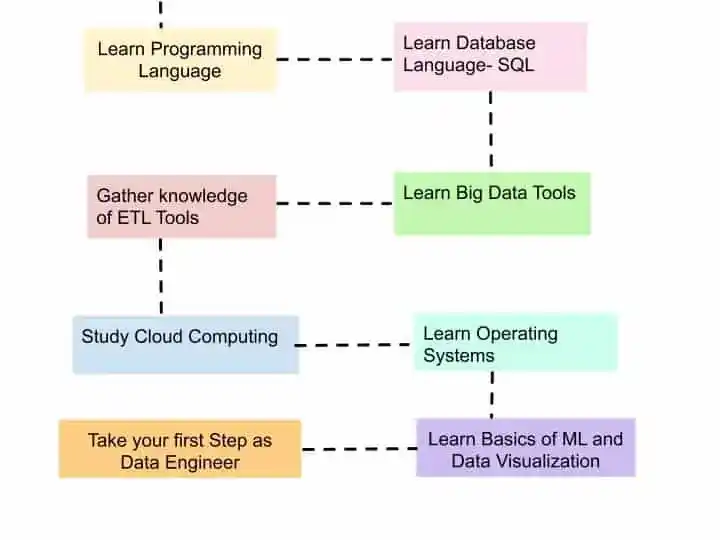
The Career Path is not much different than the skills that I discussed in the previous section. But let’s see in what order you should learn these skills and what other things you should do.
Step 1- Start with Programming Languages
To become a Data Engineer, you should have a good understanding of Programming languages and Software Engineering concepts. The industry standard mostly revolves around two technologies: Python and Scala.
Start with Python and after having a good understanding of Python, learn the basics of Scala. You can learn these languages with these resources-
- Python for Everybody – This is one of the most popular and highly enrolled Specialization Program. 1.7 M students have enrolled in this specialization program. This specialization program will teach you fundamental programming concepts including data structures, networked application program interfaces, and databases, using the Python programming language.
- Functional Programming in Scala Specialization– This Specialization provides a hands-on introduction to functional programming using the widespread programming language, Scala. This specialization is a 5 Course Series. You will learn how to Manipulate data with Spark and Scala, write purely functional programs using recursion, pattern matching, and higher-order functions, and much more.
For more details on Python Courses, check out this article- Best Python Online Courses- Enroll Today!
Step 2- Get In-Depth Knowledge of SQL and NoSQL
Start with learning SQL. SQL is the most demanding skill for Data Engineer. That’s why you should have a strong understanding of SQL. Knowledge of NoSQL is also required because sometimes you have to deal with unstructured data.
You can learn SQL and NoSQL from these courses-
- Learn SQL Basics for Data Science Specialization– Coursera– This specialization program is dedicated to those who have no previous coding experience and want to develop SQL query fluency. In this program, you will learn SQL basics, data wrangling, SQL analysis, AB testing, distributed computing using Apache Spark, and more.
- Excel to MySQL: Analytic Techniques for Business Specialization– This Specialization program is offered by Duke University. This is one of the best SQL online course certificate programs. In this program, you’ll learn to frame business challenges as data questions. You will work with tools like Excel, Tableau, and MySQL to analyze data, create forecasts and models, design visualizations, and communicate your insights.
- W3Schools– You can learn DBMS and its concepts from the Free Tutorial of W3Schools.
- NoSQL systems– In this course, you will learn how to identify what type of NoSQL database to implement based on business requirements. You will also apply NoSQL data modeling from application-specific queries.
You can check this article for More Details on SQL Courses for Data Science- Best SQL Online Course Certificate Programs for Data Science
Step 3- Learn Big Data Tools
Once you master Python and SQL, the next step is to learn Big Data tools. Knowledge of Big Data tools like- Hadoop and MapReduce., Apache Spark, Apache Hive, Kafka, Apache Pig, and Sqoop is required.
You should have at least basic knowledge of all these tools. You can learn Big Data from these courses-
- Hadoop Developer In Real World (Udemy)- This course will cover all the important topics like HDFS, MapReduce, YARN, Apache Pig, and Hive, Apache Sqoop, Apache Flume, Kafka, etc. The best part about this course is that this course not only gives basic knowledge of concepts but also explores concepts in deep.
- Big Data Specialization (Coursera)– In this specialization program, you will get a good understanding of what insights big data can provide via hands-on experience with the tools and systems used by big data scientists and engineers.
You can check out this article for more details regarding Big Data Online Courses- 8 Best Online Courses on Big Data Analytics You Need to Know.
Step 4- Understand and Learn ETL Tools
Data Engineers have to perform ETL operations. That’s why you should be familiar with ETL tools like- Informatica & Talend. You can learn these tools with online courses. I have found some resources for learning these tools-
- INFORMATICA TUTORIAL (Guru99)– This tutorial is completely free. In this tutorial, you will learn how Informatica does various activities like data cleansing, data profiling, transforming, and scheduling the workflows from source to target in simple steps, etc.
- Informatica Training & Certification (Edureka)– This training will make you proficient in Advanced Transformations, Informatica Architecture, Data Migration, Performance Tuning, Installation & Configuration of Informatica PowerCenter.
- Data integration (ETL) with Talend Open Studio ( Udemy)– In this course, you will learn how to install Talend, how to navigate, and use the interface efficiently. Along with that, you will learn how to import data into Talend and then perform the various transformation of data, cleansing, filtering, lookups, concatenations, and much more.
Step 5- Study Cloud Computing-
More and more application workloads are moving to the different cloud platforms. That’s why the data science/engineering community must have a good understanding of these clouds. You can learn about Google Cloud Platform or AWS.
You can learn Cloud Computing with these courses-
- Data Engineering, Big Data, and Machine Learning on GCP Specialization (Coursera)- This specialization program offered by Google Cloud will provide you a hands-on introduction to designing and building data pipelines on the Google Cloud Platform. In this program, you will learn how to design data processing systems, build end-to-end data pipelines, analyze data, and derive insights via presentations, demos, and hands-on labs.
You can check out some Best AWS Online Certification Courses in this article- Best AWS Online Certification Courses-Find the Best One!
Step 6- Learn basics of Operating System
Now, you have gathered enough knowledge for data engineering. Now you need to learn some basics of Operating Systems. You only need to learn the basics of UNIX and Linux.
You can learn the basics of LINUX and UNIX from TutorialsPoint’s free tutorial.
Step 7- Get basics of Machine Learning and Data Visualization Tools
As a Data Engineer, it’s not compulsory to have Machine Learning knowledge, but having a basic knowledge of ML Algorithms is a plus for you. You can learn Machine Learning Basics with the “Machine Learning by Andrew Ng” FREE Course.
You should have a basic understanding of Data Visualization tools. You can learn either Tableau or PowerBI. You can learn Data Visualization from these courses-
- Data Visualization with Tableau Specialization– This specialization program is intended for newcomers to data visualization with no prior experience using Tableau. At the end of this program, you will be able to generate powerful reports and dashboards that will help people make decisions and take action based on their business data.
- Data Visualization with Python– This course will teach you how to take data that at first glance has little meaning and present that data in a form that makes sense to people. This course will use several data visualization libraries in Python, namely Matplotlib, Seaborn, and Folium.
Find out the Best Data Engineering Online Course here- 10 Best Data Engineering Courses Online- Complete List of Resources
Step 8- Start Practicing with Real-World Projects
First of all Congratulation! You are now well versed in Data Engineering Skills. It’s time to start working on some Real-World projects. Projects are most important to get a job as a Data Engineer.
The more projects you will do, the more in-depth understanding of Data you will grasp. Projects will also provide more privilege to your Resume.
For learning purposes, you can start with real-time streaming data from social media platforms where APIs are available like Twitter.
For more Data Engineering Project Ideas, you can check this article- 13 Ultimate Big Data Project Ideas & Topics for Beginners
Step 9-Take your First Step as Data Engineer
Now you have all the data engineering skills and projects, it’s time to take your first step as Data Engineer. And that is Make a Strong Resume.
Your Resume is the first impression for any recruiters. No matter how skilled you are, if your resume is not attractive, sorry you will not get an interview call. That’s why you shouldn’t ignore your Resume.
If you want that your resume will get more privilege than others, then you should keep these things in mind-
- Read the job profile and check what skills they require, then see how many skills you have. Suppose in the job description they mentioned Knowledge of Python, and you have Python Knowledge, then definitely write “Knowledge of Python as the first skill. You can repeat the same for other skills too, just compare your skills and the skills written in the Job Description. This tip will definitely help you.
- The template of your resume should be classic.
- Avoid templates with so many graphics. It gives a bad impression to the recruiter.
- Don’t hesitate about white spaces. That means don’t try to fill the full page with text. Leave some white space that looks clean.
- Don’t write a long text like a story. It should be precise and simple.
- Mention only the most important Data Engineering Projects. Don’t mention very basic projects.
- After finalizing your resume, you need to check for grammar and spelling mistakes. Because of any grammar or spelling mistakes, your full work will be wasted. So thoroughly check for grammar and spelling before sending it to the company. You can check it on Grammarly.
That’s all!. If you follow these steps and gain these required skills, then no one can stop you to land in Data Engineering Field.
You can also check the Data Engineering Career Path by Coursera here.
Now, let’s see a brief summary of the Best Data Engineering Courses.
Data Engineering Courses
| S/N | Course Name | Free/Paid | Rating | Time to Complete |
| 1. | Data Engineering with Google Cloud Professional Certificate– Coursera | Paid | 4.6/5 | 4 months (4 hours/week) |
| 2. | Become a Data Engineer– Udacity | Paid | 4.5/5 | 5 Months |
| 3. | Become a Data Engineer– Coursera | Paid | 4.5/5 | 4 months |
| 4. | Data Engineer with Python– Datacamp | Paid | NA | 95 hours |
| 5. | Big Data Specialization– Coursera | Paid | 4.5/5 | 8 months ( 3 hours/week) |
| 6. | Data Engineering, Big Data, and Machine Learning on GCP Specialization– Coursera | Paid | 4.6/5 | 3 months (5 hours/week) |
| 7. | Data Warehousing for Business Intelligence Specialization– Coursera | Paid | 4.5/5 | 7 months (5 hours/week) |
| 8. | Modern Big Data Analysis with SQL Specialization– Coursera | Paid | 4.8/5 | 4 months (3 hours/week) |
| 9. | From Data to Insights with Google Cloud Platform Specialization– Coursera | Paid | 4.7/5 | 2 months (5 hours/week) |
| 10. | Data Engineering Basics for Everyone– edX | Free | NA | 4 Weeks |
| 11. | Big Data and Hadoop Essentials– Udemy | Free | 4.2/5 | 43 min |
| 12. | Python for Data Engineering Project– edX | Free | NA | 1 Week |
Now it’s time to wrap up!
Conclusion
In this article “Data Engineering Career Path”, I tried to give you a complete road map for Data Engineer Job. In this article, you have learned the following-
- Who is Data Engineer?, What does Data Engineer do? Roles and Responsibilities of Data Engineering, and Data Engineer Job Trends.
- What is the Salary of Data Engineers?, What Qualification is Required for Data Engineers?, and Skills Required for Data Engineer
- Data Engineering Career Path in a step by step approach.
I hope I tried to give you a complete Data Engineering Career Path. If you have any doubts or queries feel free to ask me in the comment section. I am here to help you.
All the Best for your Career!
Happy Learning!
FAQ
People also looking for
8 Best Data Engineering Courses Online- Complete List of Resources
Best Course on Statistics for Data Science to Master in Statistics
8 Best Tableau Courses Online- Find the Best One For You!
8 Best Online Courses on Big Data Analytics You Need to Know in 2025
Best SQL Online Course Certificate Programs for Data Science
7 Best SAS Certification Online Courses You Need to Know
Data Analyst Online Certification to Become a Successful Data Analyst
Best Online Courses for Data Science to become A Skilled Data Scientist
15 Best Books on Data Science Everyone Should Read in 2025
How to Get a Data Analyst Job with no Experience and with Experience?
Data Engineering Career Path: Step by Step Complete Guide
Certification Course for Business Analyst You Should Know
How to make Data Science Resume Get Hired?
Data Science vs Data Analyst: Ultimate Guide to Clear Doubts
Map-Reduce In Hadoop: Everything You Wanted to Know About
Hadoop PIG: How to Master with Super Easy Tutorial
Data Science: Top 8 Most Demanding Skills to Get You Hired
Hadoop Hive: All You need to Know About It
Top 30 Most Asked Hadoop Admin Interview Question
What is Big Data Analytics? Things no one tells you
Thank YOU!
Explore More about Data Science, Visit Here
Though of the Day…
‘ It’s what you learn after you know it all that counts.’
– John Wooden
Written By Aqsa Zafar
Founder of MLTUT, Machine Learning Ph.D. scholar at Dayananda Sagar University. Research on social media depression detection. Create tutorials on ML and data science for diverse applications. Passionate about sharing knowledge through website and social media.

